De Amerikaanse schrijver David Vann werd geboren op 19 oktober 1966 op Adak Island, Alaska. Zie ook alle tags voor David Vann op dit blog.
Uit: Caribou Island
„My mother was not real. She was an early dream, a hope. She was a place. Snowy, like here, and cold. A wooden house on a hill above a river. An overcast day, the old white paint of the buildings made brighter somehow by the trapped light, and I was coming home from school. Ten years old, walking by myself, walking through dirty patches of snow in the yard, walking up to the narrow porch. I can’t remember how my thoughts went then, can’t remember who I was or what I felt like. All of that is gone, erased. I opened our front door and found my mother hanging from the rafters. I’m sorry, I said, and I stepped back and closed the door. I was outside on the porch again.
You said that? Rhoda asked. You said you were sorry?
Yes.
Oh, Mom.
It was long ago, Irene said. And it was something I couldn’t see even at the time, so I can’t see it now. I don’t know what she looked like hanging there. I don’t remember any of it, only that it was.
Rhoda scooted closer on the couch and put her arm around her mother, pulled her close. They both looked at the fire. A metal screen in front, small hexagons, and the longer Rhoda looked, the more these hexagons seemed like the back wall of the fireplace, made golden by flame. As if the back wall, black with soot, could be revealed or transmuted by fire. Then her eyes would shift and it would be only a screen again. I wish I had known her, Rhoda said.
Me too, Irene said. She patted Rhoda’s knee. I need to get to sleep. Busy day tomorrow.
I’ll miss this place.
It was a good home. But your father wants to leave me, and the first step is to make us move out to that island. To make it seem he gave it a try.
That’s not true, Mom.
We all have rules, Rhoda. And your father’s main rule is that he can never seem like the bad guy.
He loves you, Mom.
Irene stood and hugged her daughter. Goodnight, Rhoda.”
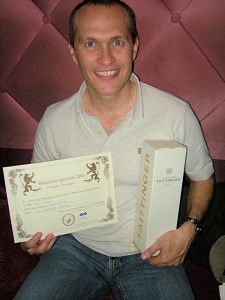
David Vann (Adak Island, 19 oktober 1966)
De Britse schrijver Philip Pullman werd geboren op 19 oktober 1946 in Norwich als zoon van een luchtmachtofficier. Zie ook mijn blog van 19 oktober 2010 en eveneens alle tags voor Philip Pullman op dit blog.
Uit: The Subtle Knife
“Will, still watching, saw the cat behave curiously.
She reached out a paw to pat something in the air in front of her, something quite invisible to Will. Then she leapt backwards, back arched and fur on end, tail held out stiffly. Will knew cat-behaviour. He watched more alertly as the cat approached the spot again, just an empty patch of grass between the hornbeams and the bushes of a garden hedge, and patted the air once more.
Again she leapt back, but less far and with less alarm this time. After another few seconds of sniffing, touching, whisker-twitching, curiosity overcame wariness.
The cat stepped forward, and vanished.
Will blinked. Then he stood still, close to the trunk of the nearest tree, as a truck came round the circle and swept its lights over him. When it had gone past he crossed the road, keeping his eyes on the spot where the cat had been investigating. It wasn’t easy, because there was nothing to fix on, but when he came to the place and cast about to look closely, he saw it.
At least, he saw it from some angles. It looked as if someone had cut a patch out of the air, about two metres from the edge of the road, a patch roughly square in shape and less than a metre across. If you were level with the patch so that it was edge-on, it was nearly invisible, and it was completely invisible from behind. You could only see it from the side nearest the road, and you couldn’t see it easily even from there, because all you could see through it was exactly the same kind of thing that lay in front of it on this side: a patch of grass lit by a street light.“
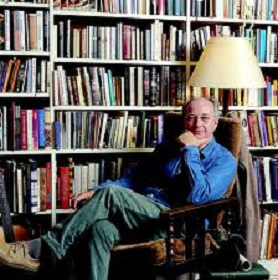
Philip Pullman (Norwich, 19 oktober 1946)
De Guatemalteekse schrijver Miguel Ángel Asturias werd geboren op 19 oktober 1899 in Guatemala-Stad. Zie ook mijn blog van 19 oktober 2010 en ook alle tags voor Miguel Ángel Asturias op dit blog.
Uit: The President (Vertaald door Frances Partridge)
“Nothing was visible ahead. Behind them crept the track like a long silent snake unrolling its fluid, smooth, frozen coils. The ribs of the earth could be counted in the meagre dried-up marshlands, untouched by winter. The trees raised themselves to the full height of their thick, sappy branches in order to breathe. The bonfires dazzled the eyes of the tired horses. A man turned his back to urinate. His legs were invisible. The time had come for his companions to take stock of their situation, but they were too busy cleaning their rifles with grease and bits of cotton that still smelt of woman. Death had been carrying them off one by one, withering them as they lay in their beds, with no advantage to their children or anyone else. It was better to risk their lives and see what would come of that. Bullets feel nothing when they pierce a man’s body; to them flesh is like sweet warm air—air with a certain substance. And they whistle like birds. the time had come to take stock, but they were too busy sharpening the machetes the leaders of the revolution had brought from an ironmonger whose shop had been burned down. The sharpened edge was like the smile on a negro’s face.”
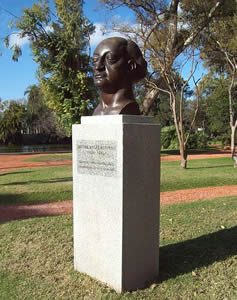
Miguel Ángel Asturias (19 oktober 1899 – 9 juni 1974)
Monument in Buenos Aires
De Amerikaanse schrijfster Fannie Hurst werd geboren op 19 oktober 1889 in Hamilton, Ohio. Zie ook alle tags voor Fanny Hurst op dit blog.
Uit: Every Soul Hath Its Song
“In this age of prose, when men’s hearts turn point-blank from blank verse to the business of chaining two worlds by cable and of daring to fly with birds; when scholars, ever busy with the dead, are suffering crick in the neck from looking backward to the good old days when Romance wore a tin helmet on his head or lace in his sleeves–in such an age Simon Binswanger first beheld the high-flung torch of Goddess Liberty from the fore of the steerage deck of a wooden ship, his small body huddled in the sag of calico skirt between his mother’s knees, and the sky-line and clothes-lines of the lower East Side dawning upon his uncomprehending eyes.
Some decades later, and with an endurance stroke that far outclassed classic Leander’s, Simon Binswanger had swum the great Hellespont that surged between the Lower East Side and the Upper West Side, and, trolling his family after, landed them in one of those stucco-fronted, elevator-service apartment-houses where home life is lived on the layer, and the sins of the extension sole and the self-playing piano are visited upon the neighbor below. Landed them four stories high and dry
in a strictly modern apartment of three dark, square bedrooms, a square dining-room ventilated by an airshaft, and a square pocket of a kitchen that looked out upon a zigzag of fire-escape. And last a square front-room-de-resistance, with a bay of four windows overlooking a distant segment of Hudson River, an imitation stucco mantelpiece, a crystal chandelier, and an air of complete detachment from its curtailed rear.
But even among the false creations of exterior architects and interior decorators, home can find a way. Despite the square dining-room with the stag-and-tree wall-paper design above the plate-rack and a gilded radiator that hissed loudest at mealtime, when Simon Binswanger and his family relaxed round their after-dinner table, the invisible cricket on the visible hearth fell to whirring.”
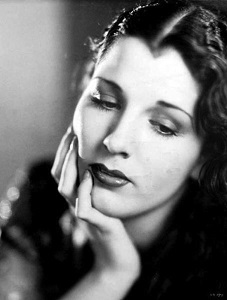
Fannie Hurst (19 oktober 1889 – 23 februari 1968)
De Engelse dichter, schrijver en essayist James Leigh Hunt werd geboren op 19 oktober 1784 in Southgate, Middlesex. Zie ook mijn blog van 19 oktober 2010 en ook alle tags voor Leigh Hunt op dit blog.
May and the Poets
There is May in books forever;
May will part from Spenser never;
May’s in Milton, May’s in Prior,
May’s in Chaucer, Thomson, Dyer;
May’s in all the Italian books:–
She has old and modern nooks,
Where she sleeps with nymphs and elves,
In happy places they call shelves,
And will rise and dress your rooms
With a drapery thick with blooms.
Come, ye rains, then if ye will,
May’s at home, and with me still;
But come rather, thou, good weather,
And find us in the fields together.
On Receiving a Crown of Ivy from John Keats
It is a lofty feeling, yet a kind,
Thus to be topped with leaves;–to have a sense
Of honour-shaded thought,–an influence
As from great nature’s fingers, and be twined
With her old, sacred, verdurous ivy-bind,
As though she hallowed with that sylvan fence
A head that bows to her benevolence,
Midst pomp of fancied trumpets in the wind.
It is what’s within us crowned. And kind and great
Are all the conquering wishes it inspires,
Love of things lasting, love of the tall woods,
Love of love’s self, and ardour for a state
Of natural good befitting such desires,
Towns without gain, and hunted solitudes.
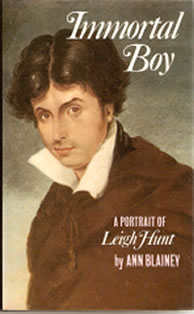
Leigh Hunt (19 oktober 1784 – 28 augustus 1859)
Cover biografie
Zie voor nog meer schrijvers van de 19e oktober ook mijn vorige blog van vandaag.
